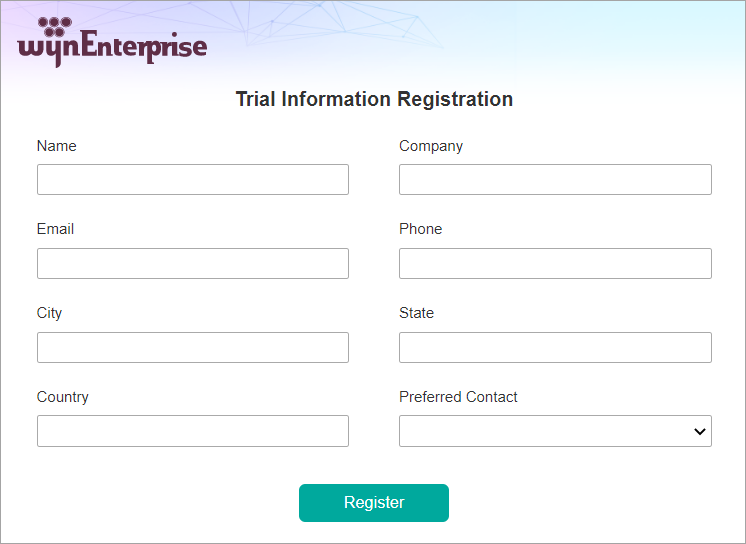- Getting Started
-
Administration Guide
-
Get Started with Administering Wyn Enterprise
- System Requirements
- Installing on Windows
- Installing on Linux
- Installing using Docker
- License Wyn Enterprise
- Deploying with HTTPS
- Deploying with Reverse Proxy
- Deploying to Azure App Service (AAS)
- Deploying to Azure Kubernetes Service (AKS)
- Deploying to AKS using Helm Chart
- Deploying to Local Kubernetes
- Deploying to Kubernetes Cluster using Helm Chart
- Deploying as a Virtual Directory or Sub-Application
- Deploying to Amazon ECS
- Deploying to Amazon EKS using Helm Charts
- Deploying in a Distributed Environment
- Migration from ActiveReports Server 12
- Upgrade Wyn Enterprise to Latest Version
- Logging on to the Administrator Portal
- Ports in Firewall
- Configuration Settings
- Account Management
- Security Management
- System Management
- Document Management
- How To and Troubleshooting
-
Get Started with Administering Wyn Enterprise
- User Guide
- Developer Guide
Installing on Mac
In this article, you will learn how to install Wyn Enterprise on Mac using docker.
To Install
Follow the below steps to install Wyn Enterprise using docker on Mac.
Download and install Docker Desktop for Mac.
Once the installation is complete, open the terminal.
Download the docker image from the public registry, using the following command.
docker pull mescius/wyn-enterpriseBy default, this command pulls the image with the latest tag.
Note: For M1 and M2 processors (Non-intel processors for Mac), the docker pull command will be:
docker pull mescius/wyn-enterprise-arm64
Create and start the docker container, using the following command.
docker run --name wyn -p 51980:51980 -d mescius/wyn-enterpriseA container with the name 'wyn' is created and starts running in the background.
Tip: Wait for a few minutes for the Wyn services to get started.
Open a web browser and visit the Wyn Enterprise portal, which is, http://{server_ip_address}:51980.
If the above link opens successfully, a Trial Information Registration page appears requesting user registration details such as its name, company name, email address, phone, city, state, country, and preferred contact.
Note that the user's name, company name, and email are mandatory fields that should be filled in to complete the trial registration form.

Note: This page only appears when the user accesses Wyn Enterprise for the first time.
The other way to provide the registration information for the users and skip the above registration form is through the environmental variables. For more information on environmental variables, please see this section.
Click Register to start working with Wyn Enterprise.
Environmental Variables
The following list of environmental variables is supported by Wyn Enterprise. Use the -e flag to set the environmental variables for the docker container which you are running.
EnvironmentallVariable | Description |
|---|---|
DB_PROVIDER | The type of database provider. The supported database providers are Postgres, SQL Server, MySQL, and Oracle. |
DB_HOST | The hostname or address of the database. |
DB_PORT | The port number of the database. |
DB_USER | The name of the database user. |
DB_PASSWORD | The password of the database user. |
ORACLE_SERVICE_NAME | The service name for the Oracle database provider. |
SINGLE_DATABASE_MODE | The storage mode for the database i.e., single or multiple. It accepts boolean values – true or false; 'true' to use a single database (wyn) and 'false' to use multiple databases (wynis, wyndatacache, and wynserverdata). |
IMPORT_SAMPLES | Lets you choose whether to import the Wyn samples. It accepts boolean values. |
REQUIRE_HTTPS | The built-in HTTPS settings for secure network connection. It accepts boolean values – true or false. |
SSL_CERTIFICATE_FILE | The path for the SSL certification file. |
SSL_CERTIFICATE_KEY_FILE | The path for the SSL certification key file. |
SITE_NAME | The name of the website. |
TRIAL_USER_NAME | The name of the user requesting a trial experience. |
TRIAL_USER_COMPANY | The company name of the user requesting a trial experience. |
TRIAL_USER_EMAIL | The email of the user requesting a trial experience. |
TRIAL_USER_PHONE | The mobile number of the user requesting a trial experience. |
TRIAL_USER_CITY | The city name of the user requesting a trial experience. |
TRIAL_USER_STATE | The state name of the user requesting a trial experience. |
TRIAL_USER_COUNTRY | The country name of the user requesting a trial experience. |
Examples
Following are a few examples of using environmental variables in the commands.
1. Use an External Database
For storing data in an external database, users must pass the database configuration details to the docker container using the environmental variables. The database configuration details include type, username, hostname, password, port, and service (available only in the case of Oracle).
In the below example, we can see that a SQL Server database is used for storing the data in Wyn Enterprise.
docker run --name wyn -p 51980:51980 -h "{host_name}" -e DB_PROVIDER="SqlServer" -e DB_HOST="gces-dev1.southeastasia.cloudapp.azure.com" -e DB_PORT= 9786 -e DB_USER="sa" -e DB_PASSWORD="********" -d mescius/wyn-enterprise2. Mount External Volume
If the user chooses to store the data in the built-in PostgreSQL database, then the data stored would get lost on the creation of a new docker container. In such a case, a user can mount an external volume (for example - /postgresql_data) to persist the data.
docker run --name wyn -p 51980:51980 -h "{host_name}" -v /postgresql_data:/var/lib/postgresql/data -v /monetdb_dbfarm:/var/monetdb5/dbfarm -d mescius/wyn-enterprise3. Avoid the Import of Wyn Samples
Set the Import Samples environmental variable to 'false' to avoid the import of Wyn samples.
docker run --name wyn -p 51980:51980 -e IMPORT_SAMPLES="false" -d mescius/wyn-enterprise4. Set Database Mode
To store the data in a single database, set the SINGLE_DATABASE_MODE environmental variable to 'true'.
docker run --name wyn -p 51980:51980 -e SINGLE_DATABASE_MODE="true" -d mescius/wyn-enterprise5. Deploying Wyn using Single-Process Mode
You can deploy Wyn using the single-process mode, and you can also specify it when deploying using the docker image.
docker run --name wyn -p 51980:51980 -e SINGLE_PROCESS_MODE="true" -e DB_PROVIDER="SQLite" -v /wyn/conf:/wyn/conf -v /wyn/logs:/wyn/logs -v /wyn/data:/wyn/wyndbs -d mescius/wyn-enterprise6. Establish SSL connection
To provide support for SSL connection in the docker container, you need to pass the relevant information with the help of environment variables, as shown in the below example.
docker run --name wyn -p 443:443 -v /my/ssl/certs/location:/usr/local/share/ca-certificates/wyn -e REQUIRE_HTTPS="true" -e SSL_CERTIFICATE_FILE="my-cert.crt" -e SSL_CERTIFICATE_KEY_FILE="my-cert.key" -e SITE_NAME="my.site.com" -d mescius/wyn-enterprise7. Trial Registration
When a user requests a trial experience, he is required to register with Wyn Enterprise by providing the following details - name, company name, email address, phone, city, state, and country. This is because only a registered user can work with Wyn Enterprise on a trial basis.
The trial registration information can be passed to the docker container by using the environmental variables, as shown in the below example.
Note: The specification of the user's name, company name, and email address is necessary to complete the registration process.
docker run --name wyn -p 51980:51980 -e TRIAL_USER_NAME="John" -e TRIAL_USER_COMPANY="ABC" -e TRIAL_USER_EMAIL="John@ABC.com" -d mescius/wyn-enterpriseAfter successful registration, users can open the Wyn Enterprise portal and log in by entering their usernames and passwords.
However, if a user skips or forgets to pass the registration information through the environmental variables, a Trial Information Registration page will display on opening the Wyn Enterprise portal. This page requests users to enter their respective registration information. For more information about the Trial Information Registration page, please see this section.
To Remove the Docker Container
Follow the below steps to delete the docker container running Wyn Enterprise.
Use the following command to get the docker container ID.
docker psStop the docker container running Wyn Enterprise using the following command.
docker container stop [container_id]Delete the stopped container running Wyn Enterprise, using the following command.
docker container rm [container_id]



